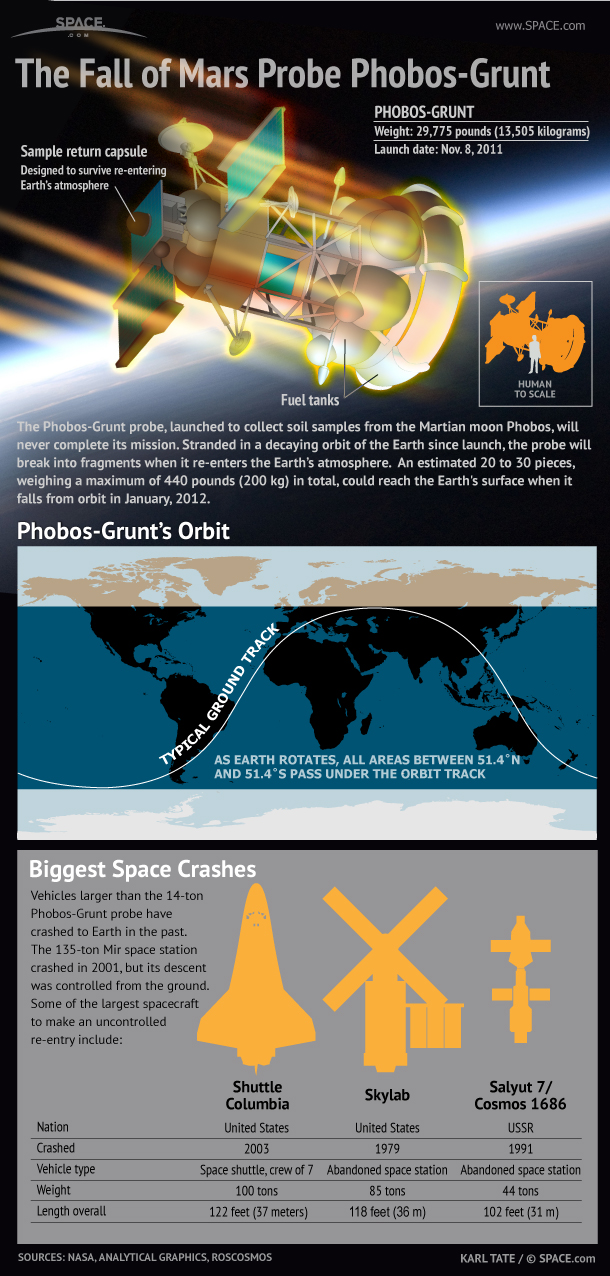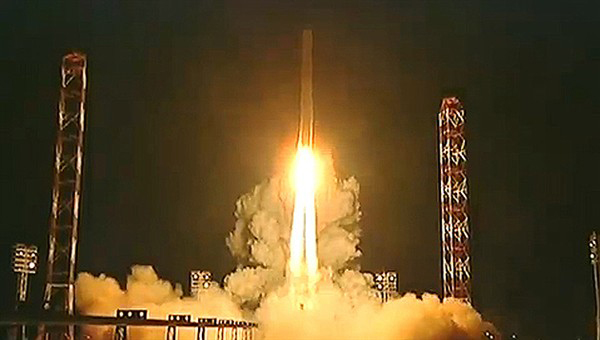Space Radiation Doomed Russian Mars Probe That Crashed: Reports

Space radiation most likely caused the demise of a Russian Mars probe that got stuck in Earth orbit shortly after launch and ultimately crashed back to the surface earlier this month, Russia's Federal Space Agency chief said today (Jan. 31), according to media reports.
Russian space chief Vladimir Popovkin said that an investigation pointed to cosmic radiation as the likely culprit in the failure of the Phobos-Grunt mission, but also suggested that an imported spacecraft component may not have been adequately hardened for the harsh radiation environment in space, reported the Associated Press.
"Two components of the onboard computer system were spontaneously rebooted and it switched into a standby mode," Popovkin said in a televised remark, according to the Russian news service Ria Novosti. "The most likely reason [for the glitch] is the impact of heavy charged space particles."
Russia's Phobos-Grunt space probe malfunctioned shortly after its November 2011 launch, preventing it from continuing on toward Mars.
After being marooned in Earth orbit for more than two months, the Phobos-Grunt fell back to Earth and plunged through the atmosphere on Jan. 15. The $165 million spacecraft reportedly broke apart over the Pacific Ocean, off the coast of Chile.
Popovkin met with Russian Deputy Prime Minister Dmitry Rogozin in the city of Voronezh Tuesday to present the initial findings of an investigation into the Phobos-Grunt failure. Popovkin added that some imported microchips used on Phobos-Grunt may have been low-quality and susceptible to radiation, but he did not give details about where the chips originated, according to the AP. [Photos: Russia's Phobos-Grunt Mission to Mars Moon]
According to Yuri Koptev, a former space agency head who led the Phobos-Grunt investigation, 62 percent of the microchips used in the construction of the Mars probe were considered of an insufficient quality for spaceflight, reported the AP.
Breaking space news, the latest updates on rocket launches, skywatching events and more!
Popovkin said that officials involved with the spacecraft's construction would face punishments for the mismanagement.
Previously, Russian officials claimed everything from accidental radar interference to foreign sabotage was to blame for the demise of Phobos-Grunt.
The ambitious mission was designed to collect soil samples from the Mars moon Phobos and return them back to Earth in 2014. Russian officials have discussed a repeat mission either on their own, or as part of the European Space Agency's ExoMars project.
"We are holding consultations with the ESA about Russia’s participation in the ExoMars project … If no deal is reached, we will repeat the attempt [to launch a Phobos mission]," Popovkin said, according to another Ria Novosti report.
The Phobos-Grunt failure is one of a string of setbacks suffered by Russia's Federal Space Agency over the past year.
Most recently, problems were uncovered with the Russian Soyuz spacecraft that is scheduled to take three new crewmembers to the International Space Station in late March, according to the AP.
Popovkin said the launch will be postponed "likely until the end of April" because of the issues, but NASA has yet to announce a new targeted launch date.
Follow SPACE.com for the latest in space science and exploration news on Twitter @Spacedotcom and on Facebook.

Space.com is the premier source of space exploration, innovation and astronomy news, chronicling (and celebrating) humanity's ongoing expansion across the final frontier. Originally founded in 1999, Space.com is, and always has been, the passion of writers and editors who are space fans and also trained journalists. Our current news team consists of Editor-in-Chief Tariq Malik; Editor Hanneke Weitering, Senior Space Writer Mike Wall; Senior Writer Meghan Bartels; Senior Writer Chelsea Gohd, Senior Writer Tereza Pultarova and Staff Writer Alexander Cox, focusing on e-commerce. Senior Producer Steve Spaleta oversees our space videos, with Diana Whitcroft as our Social Media Editor.

